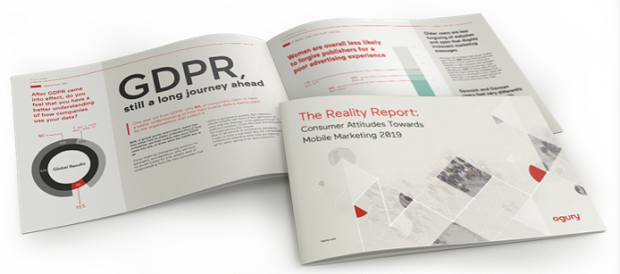
Over half (52%) of consumers globally agree that intrusive or irrelevant mobile marketing messages give them a poor opinion of the app or website that hosts them, according to new research.The study, from Ogury, looked in global consumer attitudes towards mobile marketing.
The survey is the largest of its kind to date, and includes responses from 287,571 mobile users across the UK, US, France, Germany, Italy and Spain. It notably reveals that current marketing practices are damaging consumer opinion of apps and websites that host targeted marketing messages, making marketing spend less effective and threatening loss of business for all stakeholders.
Findings include:
– 52% of consumers globally agree that intrusive or irrelevant marketing messages give them a poor opinion of the app or website that hosts them.
– Only 25% of UK respondents believe that targeted messages are useful.
– 9 out of 10 UK users find targeted marketing messages annoying.
Marketing spend on mobile ads currently stands at $164bn per annum.
Wider market data suggests that the majority of mobile ads are served by Big Tech companies, otherwise known as the walled gardens. These technology behemoths have access to an incomparable mass of user data, enabling them to target users with relevant messages.
However, 9 out of 10 UK users find targeted marketing messages annoying, even though 13% out of the 88% find them also useful. Clearly, more data alone does not equate to user value.
More data doesn’t seem to be the answer. User choice might be
Tech giants have come under public scrutiny for their deceitful data handling practices, and the way they use data to target consumers with ads, without explicit permission. Unless users are given an explicit choice, to share data or not, to receive ads or not, there will always be an underlying resentment towards the ads they are shown.
This is what Thomas Pasquet, Ogury’s co-founder and co-CEO, had to say on the matter, “If users feel any form of intrusion, they will be annoyed regardless of the relevancy of the message they receive.” Pasquet continued, “Therefore, brands and publishers should always offer consumers clear and fair choices: accept anonymous data to be collected to receive customized marketing; opt-out from sharing data and therefore receive irrelevant ads; or pay a fair price in exchange for a marketing free and data collection free environment.”
Mobile users blame both the message and the messenger
Intrusive and irrelevant messages can have a negative impact on a brand’s reputation. But the study also reveals that 52% of users globally agreed that intrusive and irrelevant messages give them a poor opinion of the app or website that hosts them. These numbers are alarming for both brands and publishers. If users’ appreciation is continually eroded by intrusive marketing, the net result will be loss of business for all stakeholders.
Elie Kanaan, Ogury’s CMO , said, “This survey shows that brands and publishers should keep the long-term business outcomes in sight. They should not be lured by short term gains from serving intrusive or irrelevant ads. It is simply a business model that will scare away half of their customers.”
Mobile ads or emails are preferred to phone alerts.
The survey found that when given a choice, 82% of users globally preferred to receive marketing messages through mobile ads or emails. Phone alerts, such as push notifications and texts, are the least popular method amongst respondents.
“At least two things need to happen to change users’ perception of digital marketing: give users clear choices and respect these choices when they are made” Kanaan continued. “Ogury is inviting the digital ecosystem to embrace this new marketing model driven by choice and providing a fair value exchange among consumers, publishers and brands.”
About the Survey:
Ogury conducted the survey from February 12th to 18th 2019 in the US, Germany, Spain,
Italy, France and the UK, featuring answers from 287,571 mobile users globally. In the UK,
the number of respondents was 46,964.
